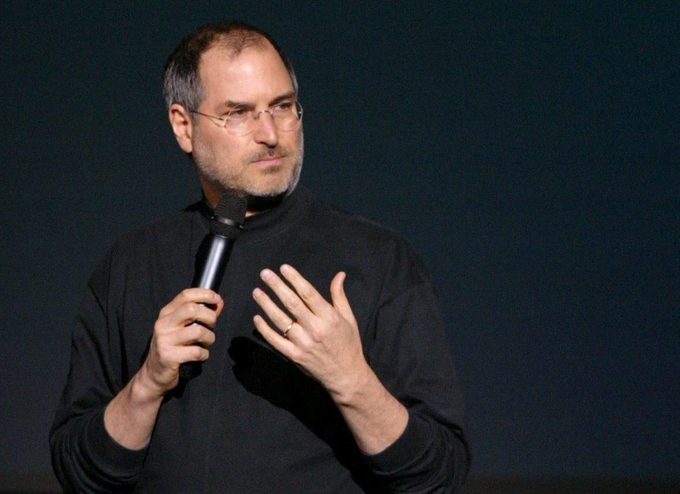Steve Jobs's dying words don't disappoint

The Rumors—And Truth—Behind Steve Jobs’s Last Words

People know Steve Jobs for his creativity, innovation and inspiring quotes, like his most famous: “Stay hungry. Stay foolish.” So there was, understandably, a lot of hype and curiosity regarding the late inventor’s last words after his death in October 2011. What were Steve Jobs’s dying words, and why have they generated so much discussion?
Reader’s Digest clears up the rumors and controversy about Steve Jobs’s dying words, and explores the fallout that followed in the years since. Keep reading to learn what he said, what it meant and what others had to say about the tech titan’s untimely death.
Get Reader’s Digest’s Read Up newsletter for more tech news, philosophy, quotes, history and fun facts all week long.
What was the cause of Steve Jobs’s death?
Steve Jobs died of pancreatic cancer, eight years after being diagnosed with the disease in 2003. Pancreatic cancer is often very aggressive, but the Apple co-founder had a rare, slow-growing form of the disease. His death in 2011 at the age of 56 was shocking, and everyone from former President Barack Obama to Meta founder Mark Zuckerberg spoke out.
Bill Gates, Jobs’s former rival in the computer race of the 1980s, made the following statement: “I’m truly saddened to learn of Steve Jobs’ death … Steve and I first met nearly 30 years ago, and have been colleagues, competitors and friends over the course of more than half our lives. The world rarely sees someone who has had the profound impact Steve has had, the effects of which will be felt for many generations to come …”
What were Steve Jobs’s dying words?
Steve Jobs’s last words were “OH WOW. OH WOW. OH WOW,” according to his sister, Mona Simpson. She recounted his final moments in her New York Times eulogy, published on October 30, 2011. He spoke these words hours before his death while surrounded by his family: “Before embarking, he’d looked at his sister Patty, then for a long time at his children, then at his life’s partner, Laurene, and then over their shoulders past them.”
Why were Steve Jobs’s last words controversial?

His actual final words were not controversial, but words that were improperly ascribed to him in the years after his death did generate discussion. Here’s what happened:
Soon after his death, rumors began circulating on the internet about what Jobs said and what he meant. Many wanted to ascribe meaning to the utterances, which is understandable given the weight of the death on the tech world. But there was also an opportunistic quality to some of the speculation, which came to a head in 2015.
That year, an essay attributed to Steve Jobs began circulating online. The subject was the “non-stop pursuit of wealth,” and it promoted the idea that materialism was not a worthwhile pursuit. But according to Snopes, there is no evidence that Jobs wrote the essay or spoke of its themes on his deathbed. Neither Jobs’s family nor Apple has ever confirmed its contents.
What about Jobs’s actual final words? What did they mean? Jobs’s biographer Walter Isaacson told NPR that he talked to Jobs about his beliefs in God and the afterlife: “He said, ‘You know, I’m kind of 50/50 on believing in God. But I want to believe that something endures, that your wisdom that you accumulate, that the knowledge that you have somehow is able to endure after you die.'”
Isaacson went on to say that Jobs equivocated, saying that “maybe it’s like an on-off switch,” and wryly commenting that perhaps that was why he didn’t like to put on-off switches on Apple devices. Even though no one will ever know the exact meaning of Steve Jobs’s dying words, people will likely continue speculating about them indefinitely.
Why trust us
At Reader’s Digest, we’re committed to producing high-quality content by writers with expertise and experience in their field in consultation with relevant, qualified experts. We rely on reputable primary sources, including government and professional organizations and academic institutions as well as our writers’ personal experiences where appropriate. We verify all facts and data, back them with credible sourcing and revisit them over time to ensure they remain accurate and up to date. Read more about our team, our contributors and our editorial policies.
Sources:
- New York Times: “A Sister’s Eulogy for Steve Jobs”
- NIH National Library of Medicine: “What can we learn from Steve Jobs about complementary and alternative therapies?”
- NPR: “New Bio Quotes Jobs On God, Gates And Great Design”
- Snopes: “Steve Jobs Deathbed Speech”























